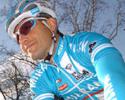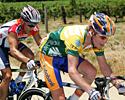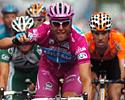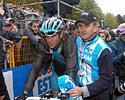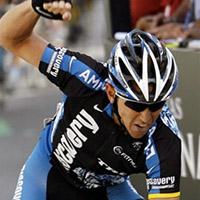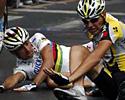Latest Cycling News for May 24, 2007Edited by Gregor Brown Zabel and Aldag confess EPO usageBy Susan Westemeyer in Bonn
A tearful Erik Zabel appeared at the T-Mobile press conference Thursday along with former teammate Rolf Aldag to confess to using the banned blood booster EPO while riding for the Team Telekom in the 1990s. Current T-Mobile Team Manager Bob Stapleton praised the two for coming forward, saying that Aldag would continue to work for the team, and promised "further significant changes in our program this year and next year." (Read Cyclingnews' earlier article on the scheduled press conference.) Zabel was a surprise guest at the press conference in Bonn, Germany. Visibly moved and fighting back tears -- sometimes unsuccessfully -- he admitted to having used EPO during the first week of the Tour de France 1996. The side-effects were so great, however, that he stopped with it. He admitted that he did not know how his current team Milram would accept his confession, and it not clear what is his present status with the team. He was unable to control his voice or hold back his tears when he spoke of his son Rick. "My son rides, too, and I don't want him to go through what I went through," said the four-time winner of Milano-Sanremo. "It doesn't make any difference whether it happened one time or over two years, the point is that it was forbidden to dope, and I doped. I doped, I lied and I apologize for that." Aldag confessed to a longer history of doping. He started with EPO before the 1995 Tour de France, and he said that continued with it. In 1997, he hit a hematocrit of 50 percent, and started wondering whether it was worth it. His highest blood value was 53 percent. Finally in 1999, at the age of 30, he decided to stop using the products. Stapleton said that a major reason he decided to keep Aldag on was the team. "I have spoken to our athletes, asked how they feel about things and about the team management. Many of them said that Rolf Aldag was the reason they are here. That is very important. They resoundingly said that he should stay and that he has their full and complete support." Heinrich follows Schmid's confessionDoctors fired from clinicFollowing the confession by colleague Andreas Schmid, Doctor Lothar Heinrich has admitted his involvement in doping riders of the former Telekom squad. The German had been working as a sports doctor in the team's current incarnation, T-Mobile, up until May 3, when he was suspended from service by T-Mobile Team Manager Bob Stapleton following the revelations made in former Telekom soigneur Jef d'Hont's book. "I took part in doping of riders in the course of my work as a sports doctor," Lothar said yesterday afternoon, according to AP. Heinrich's confession contrasts with an earlier public letter of innocence. "The charges are not for me to be understood and do not have any basis," Heinrich said less than two weeks ago regarding d'Hont's claims. "As a doctor, it is my duty to maintain the health of my patients and to handle illnesses. ... For me to inject EPO or to provide it to masseurs to pass on, therefore does not come into question for me." Heinrich and Schmid were alleged by d'Hont to having provided illegal doping products to Team Telekom members during the 1996 Tour de France. Both doctors will likely face an inquiry by the Germany's local prosecutor and, following an investigation, have been fired by the Freiburg University Clinic. Walker's Giro d'Italia testingBy Jean-François Quénet in Pinerolo
Rabobank's young Australian William Walker crossed the finishing line of Giro d'Italia stage 11 in Pinerolo with a smile on his face. He was happy to have avoided the crashes amid the slipping sprinters, but he was also happy to be coming of age only one year after turning professional with ProTour Rabobank team. Previously, he'd been a member of the team's continental squad. Currently 25th on GC, Walker has the honour of being the highest ranked English-speaker of the Giro as well as the third in the best young rider classification. "It's really nice to be there," he said. "But it's pretty unrealistic to believe that I'll be able to keep this position among the young [rider Maglia Bianca] category. I was happy with the way I climbed yesterday but the hill was only eight kilometres long. There are bigger mountains to come. I want to test myself again and it might tomorrow already, but I'll do it by going in breakaway." It was his presence in the front group on stage 8 going to Fiorano Modenese that allowed him to move up on GC. "Today was the most boring cycling day in my career," he laughed after stage 11 in Pinerolo. "Look at the time we spent on the bike: four hours and 46 minutes! And my average heart rate was 100. It was better than another hard and fast day in between the climbs. It was good actually. Most of the guys were tired after yesterday's stage. Everybody aimed at a day off or so." "The Giro is definitely not like the Tour de France," he concluded. "The interest must be smaller because we'd never see such a slow stage at the Tour de France." Petacchi on par with Coppi
Yesterday in Pinerolo, Alessandro Petacchi took his 22nd Giro d'Italia stage, which put him on par with Italian legend Fausto Coppi and Belgian Roger De Vlaeminck, but it was almost not to be due to his fear of the wet roads. Rain started to fall in stage 11 and Petacchi's mind flashed back to the brutal crash in stage three of the 2006 Giro. The incident left him with a fractured kneecap and a shattered morale. "I seriously thought to pull myself out of the front positions, I am not ashamed to say that when it rains I am afraid," he reflected after the stage, according to La Gazzetta dello Sport. However, seeing his Milram teammates forming for the lead-out inspired the 33 year-old Italian sprinter. "When I realized the team was working splendidly, steering me in front to line and, therefore, in a less dangerous position, I decided to go on [with the sprint]. I did not crash. The Lancaster train in the finale was wild! He is a true track rider.
"The sprint went well," he continued. "I won even though Balducci was so close. Now, don't ask me if I have intentions on continuing." The maxi-caduta ('large crash') saw many riders crossing the finish line without their bikes. "I was sure that someone would end up on the ground; on the publicity streaks you can't stay upright, as soon as you touch your brakes you fly to the ground." Petacchi is considering his season and the fact that "there are only two more [sprint] stages" in the Giro. "My objective was not the number of wins but to that I still had the capability to win, and this I have done." He wants to vie for stage victories in the Tour de France and the Vuelta a España. Petacchi's 22 stage wins put him in eighth of the all-time Giro stage winners; first is Super Mario Cipollini, 42, and second is Alfredo Binda, 41. "For a sprinter it is easier. I can't be compared to him [Coppi]." Davis gets morale boostBy Greg Johnson
Australia's Allan Davis is delighted with what he described as a morale-boosting victory in the Volta a Catalunya's third stage. The Discovery Channel rider's first stage victory in a UCI event since January 2006 marks a milestone for the 26 year-old, who has endured a difficult 12 months after being implicated, and subsequently cleared, in Operación Puerto and suffering an injury earlier this season. "[It was] unexpected, but a very welcome win," Davis told Reuters. "I've been ill since taking second in the Milan-Sanremo with tendonitis, so this is good for the morale. "Plus we didn't catch a day long-break until 800 metres from the line," added Davis. "I really thought it was going to be too close to catch them." Prior to his bout of tendonitis, Davis had started the 2007 season on a positive note, with top three places on the Tour Down Under's Stage 5 and the Tour of California's opening stage. His form continued in March were he took a solid fifth position on the Tirreno-Adriatico's seventh stage before going on to take second at the Milano-Sanremo. "The last year has been very tough," noted Davis. "But at least now I can put that behind me and look towards the future. It's horrible when suddenly your name appears involved in an affair like that and you've always played fairly and by the rules." While Davis was delighted with the stage's outcome, countrymen Baden Cooke (Unibet.com), who finished in second place, wasn't so enthused about the outcome. "I'm so disappointed", said Cooke. "I was in a perfect position to win the stage, but Allan Davis cut me off in the final metres!" The two Australians will be fierce rivals over the remaining four stages of the Spanish event, with both currently sitting 27 seconds behind race leader Imanol Erviti (Caisse d'Epargne) on general classification. The pair is also contesting a close battle in the point’s classification, with Cooke currently holding the jersey on 34 points to second placed Davis on 32. "The odds of me giving a leader's press conference tomorrow evening are pretty small," said Davis. "I'll do my best, it's been fun leading, but I don't think I'm strong enough to hold on." Until Catalunya, Davis' last UCI stage victory came at his home event – the Tour Down Under – where he won stages two and five, in addition to the overall point’s jersey. Nikolai Trusov's tale
Stage 11 of the Giro d'Italia ended in what the Italians call a 'maxi-caduta'. Rider after rider came down on the wet and slick pavement over the finish line. The first of the riders to hit the deck was Russian Nikolai Trusov (Tinkoff Credit Systems), who achieved his best result so far in the Giro but did so on while sliding on his backside over the line. "The rain started just before Pinerolo," explained the 21 year-old to Tinkoff's Press Officer Sergey Kurdyukov. "It would have been better if it showered cats and dogs; the drizzle is the worst ... as the road turns into a skating rink. "The speed was as high as ever, though, and the attackers were brought back, including [teammate] Ignatiev three kilometres to go. Elio Aggiano gave me a good lead-out, but I found myself at the front a trifle early. I then started to search for a hole but all the doors were closed. I just freewheeled across the line when the front wheel slipped on the wide finish line, and before I knew it I was sliding on my bottom." The crash also involved World Champion Paolo Bettini. The Italian was the second rider to lose control of his bike. "Paolo Bettini bumped into me, and then it seemed like every second rider fell. Each of them crashed all by himself, thank god. They just tried to brake but there was plenty of fresh paint on the tarmac. As far as I saw, no one got into serious trouble. "I'm pretty philosophical about my grazes; it's a part of the job. Our leader Evgeni Petrov also fell, he says it won't influence his performance either. Mechanics had to change almost half of the components on my bike, but the frame and fork are OK." The young Russian, in his fourth year as a professional, is worried about the coming mountain stages. Stage 12, from Scalenghe to Briançon, will be "the hardest mountain stage I've ever ridden. Normally on a training ride I never get higher than 1500 metres, in some races in Spain we rode passes above 2000 metres, but you can't compare a 2.2 stage race to the Giro, they are worlds apart in terms of speed and competition. On the other hand I'm comfortable with the altitude, judging from my track experience in Mexico. "Frankly speaking, I was afraid of the Giro before the start as I thought it would be 20 Tours of Flanders (my horrifying ProTour debut race). It turned out the Giro is slightly less wild. The more I come to terms with the Giro, the stronger I feel. Perhaps getting to Milan is not just a daydream of mine." Re-live stage 11 by reading Cyclingnews' live report. Wiesenhof stops sponsorship at end of yearTeam Wiesenhof will have to look for a new title sponsor. The sponsor firm Gruppe Wiesenhof announced Thursday that it would end its engagement as of the end of this year. "The current conditions and developments in professional cycling have brought us to this step," said Peter Wesjohann, a member of the company's board of directors. Wiesenhof is a Professional Continental team. The company has sponsored various teams since 2001, mostly amateur and junior teams. "It wasn't an easy decision, especially since there is a great spirit on the current Wiesenhof-Felt team, and they have done good work. We would like to thank our riders and the management. The decision not to extend our contract which expires December 31, 2007, has nothing to do with the team management or riders in any way, but only with the current situation in professional cycling." (All rights reserved/Copyright Knapp Communications Pty Limited 2007) |

|
January 2009 |
Recently on Cyclingnews.com |

